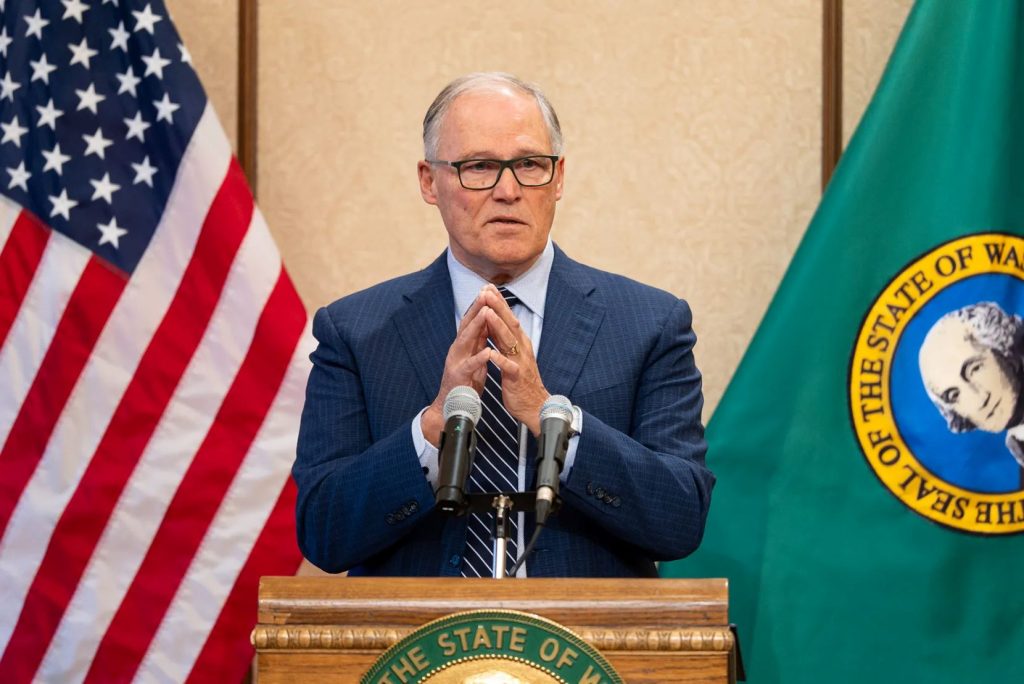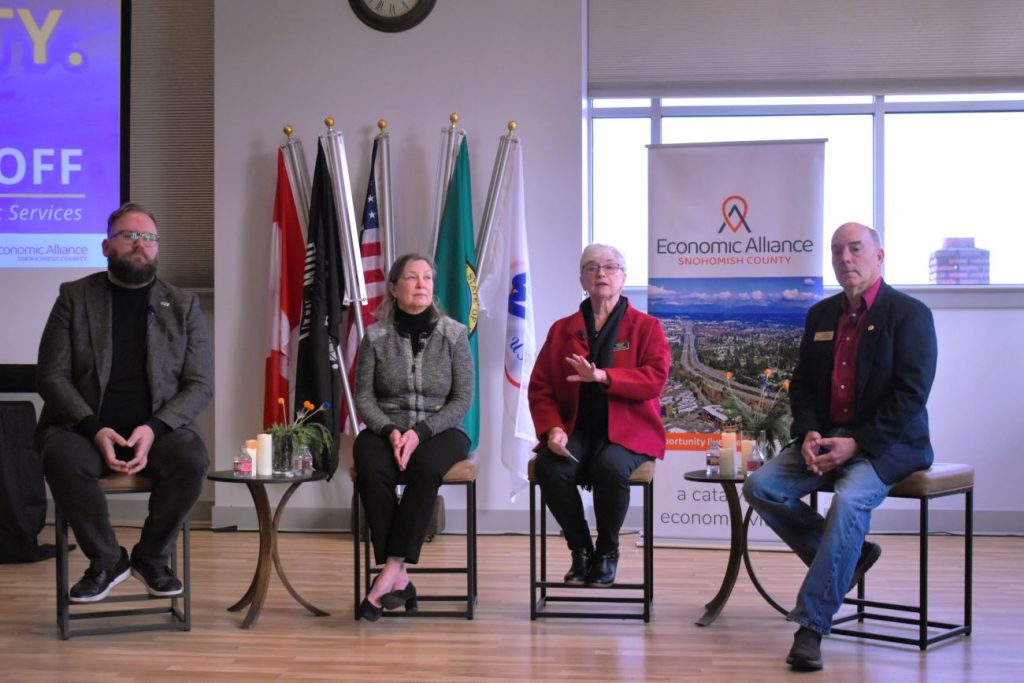OLYMPIA—Governor Jay Inslee held a press conference on Tuesday, December 17, addressing his proposed $69.8 billion 2025-2027 biennium state budget in what very well might be the last press conference he ever holds as Governor.

“I want to express pride in Washington today and this announcement we’re making today. I was so in love with Washington when I started this job and I’m much more in love with her now. The qualities of Washington that I’ve seen and experienced and we’re going to present a budget today that will continue the reasons for that pride,” said Inslee.
A breakdown of the proposed budget is as follows:
- Housing: $905 million for 5,000 additional affordable housing units, homelessness services, and preventing evictions and foreclosures.
- Behavioral health: $719 million to continue expanding access to mental health and substance use treatment and recovery services.
- K-12: An additional $1.3 billion for K-12 schools to support increased costs for maintenance, supplies, technology and educator compensation.
- Childcare and early learning: $510 million to improve provider subsidy rates for Working Connections Child Care. $48 million for increased ECEAP rates school and right-sizing of the program to reduce unused part day slots and create 750 school day slots. Expanded entitlement for ECEAP is delayed.
- Public safety: $3.5 million to maintain the recent expansion of training for local corrections officers. $7 million for 60 additional state law enforcement officers, and $13 million for deployment of speed cameras to reduce work zone injuries and deaths. $33 million to open a new juvenile rehabilitation center.
- College and career training: $6 million to continue full funding for Career Connect Washington and $182 million to maintain the nation’s most generous financial aid program, Washington College Grant.
- Clean energy transition: $982 million of funding from the Climate Commitment Act continues popular and emission-reducing programs such as Washington’s EV rebate program, cost-saving weatherization improvements, electric school buses, hybrid-electric ferries, and free transit for youth.
- Retention and recruitment: Most Washington state employees will receive small cost-of-living adjustments of 3% in 2025 and 2% in 2026. The consumer price index — a measure of inflation — increased 3.0% in the Seattle area over the past year.
- Transportation: Sustained funding for new ferries and improved ferry service, and increased funding for fish barrier removal projects to meet the state’s legal responsibilities. Climate Commitment Act funding allows for additional bike and pedestrian projects and more transit services across the state. A funding gap for highway projects will require legislators to explore options to adjust delivery timelines or funding.
Inslee said Tuesday that his proposed budget imbeds the values of Washingtonians while still moving forward in progress the state has made over the last several years.
In previous years prior to Governor Inslee’s seat, Washington State budgets required major reductions in spending and investment decisions, but the Governor said Tuesday that today the state’s economy is not in recession.
“It’s doing as well as ever. Several years ago, the state made extraordinarily difficult budget decisions as they grappled with budget gaps in the neighborhood of nine billion dollars,” said Inslee. “When I was sworn in in 2013 legislators had reduced spending by eleven billion dollars and they did things that leaders would sometimes do, especially during times of recession; they froze unnecessary hiring and travel, they consolidated or eliminated some agencies or functions, and they directed agencies to reduce fuel consumption. But that didn’t add up to eleven billion dollars.”
At that time, before Inslee stepped in as governor, the legislature suspended two voter-approved education initiatives to reduce class sizes and increase teacher pay. They also took away state healthcare from 40,000 low-income Washingtonians, Inslee added, while cutting funds to universities and colleges that caused tuitions to soar, slashing mental health care services at state hospitals, reduced safety net programs for elderly and with disabilities in poverty, and cut state workforce by 12%.
But now Washington State is faced with a greater budget shortfall than back in 2013—as much as $16 billion over the next four years. Gov. Inslee announced Tuesday that he is proposing a “balanced budget” to address the shortfall, which he said is important for the fiscal integrity of the State of Washington.
As far as cuts, the Governor has already directed a freeze on non-essential hiring, contracts, and travel. His budget proposal also includes roughly $2 billion in reductions or delays over the next four years including closing the Mission Creek Center, closing three re-entry centers in Corrections, closing two RHC’s, delaying Board bonuses for educators, and pausing childcare eligibility expansion that would otherwise take place.
Inslee added that these cuts are “big” but “necessary” given the circumstances of the state’s budget. He is also proposing to merge the state’s left one and left two pension systems which would allow a one-time transfer of $1 billion from the state’s general fund while still leaving a surplus in the left system.
Despite Inslee’s proposed $2 billion in budget cuts, he stated Tuesday that anything more would direct the state backwards in its progress.
“This budget, I think, follows Abraham’s Lincoln’s admonition. He said ‘as our case is new so must we think anew’ and our case is new in the State of Washington. Our case is new in the sense that at a moment we have unparalleled wealth being created in our state, at a time when the economy is soaring, at a time when people have moved in by about one million people because of our good economy, it is still a time when we have thousands of people who are ill-clad, ill fed, and unhoused,” said Inslee. “I believe to address this new economy we need to think anew.”
Part of this “anew” thinking is proposing to increase revenues to respond to this dynamic change in economy, Inslee continued.
The top priority of Inslee’s proposed budget was to protect the progress that Washington State has been making, through programs and services for working families and small businesses. This includes public safety, education and early learning, housing, and behavioral health.
“We need a budget that keeps us moving forward in our state, that puts working families first, and continues creating a fair tax system,” said Inslee. “We have one of the strongest economies in the country that has produced thousands of millionaires and billionaires. We have proposed what I would consider fairly modest tax on incomes of extraordinary amounts.”
Inslee was referencing a proposed new wealth tax in his budget which, he says, would generate approximately $10.2 billion over the next four years but imposing a 1% tax on worldwide wealth that exceed $100 million. This would affect about 3,400 Washingtonians.
Inslee noted that he is “fairly confident” that what he considers a “modest tax”, would not affect the living standards of anyone with over $100 million in assets.
As of now Washington State’s tax system is still slightly below average in terms of the amount of revenue it generates. Low-income Washingtonians, even after the adoption of the Capital Gains tax, pay six times a greater share of their income than the wealthiest residents according to Inslee.
The Governor’s proposed budget also includes a tax change on some businesses that he said would raise approximately $2.6 billion (about a 10% increase to the existing rate). This tax would be on companies with an annual income exceeding $1 million on certain tax categories.
Other areas the Governor is focusing on in his proposed budget is behavioral health, substance abuse, school technology and maintenance, childcare subsidies, funding police officers (including hiring more state troopers), transportation infrastructure, or clean energy transition.
Democrats applauded Gov. Inslee’s proposed budget Tuesday with Senator June Robinson (D-Everett) stating:
“The governor’s proposal serves as a strong starting point for our work in the Senate. We will carefully consider all options to close the shortfall, minimize disruptions to essential services, and ensure every Washingtonian — regardless of zip code or income — has access to opportunity, stability, and a better future. I’m confident that, through collaboration and focus, we will deliver a budget that puts people first and prepares us for the challenges of tomorrow.”

However, on the other end of the aisle some Republicans criticized the Governor’s budget, blaming the state’s deficit on overspending and saying the proposed budget goes against the Governor’s promise to not raise taxes.

“This budget is not a serious proposal. Governor Inslee’s $13 billion tax hike and reckless spending increase show just how out of touch his administration is with the financial realities facing Washington families,” wrote Rep. Travis Couture (R-Allyn). “Our state has a spending problem, not a revenue problem. Despite record revenues over the past four years, Democratic leaders in the Legislature have consistently engaged in unsustainable budgeting by spending more revenue than was expected to be raised directly, causing this current deficit. No Washington family has the luxury of engaging in this level of fiscal irresponsibility.”
Now that the Governor’s proposed budget has been submitted it goes to lawmakers for their deliberation.
Washington State’s budget is separated into three different budgets: operating (schools and human services), capital (public buildings, parks, etc.), and transportation (roads, bridges, walkways, etc.).
Every fall the Office of Financial Management submits requests. The Governor then takes these requests and write a budget proposal which he submits the legislature in December. Once the legislative session opens up in January lawmakers will then hold hearings on the Governor’s proposals with the State’s finalized budget plan being finalized typically sometime around March.
Author: Kienan Briscoe













2 Responses
Dear Governor, Inslee i want to thank you, for leaving. You have destroyed the great state of Washington, I hope the worst future for you, you need to live your future, the same destruction you caused the people of the great state of Washington. Good by.
Mr. I Inslee, when you took office there was an almost $2 billion surplus. You democrats have sunk a lot of states into massive debt and your only fix is, is to raise taxes. Before becoming a governor he/she/other
should have to take an economics class, and pass it.